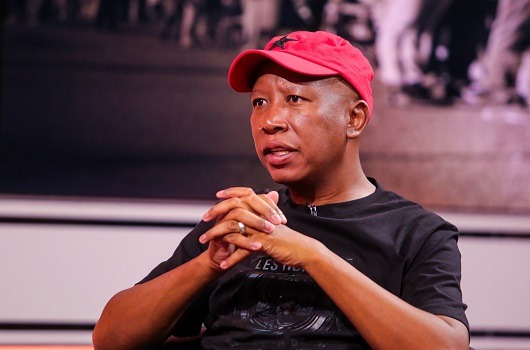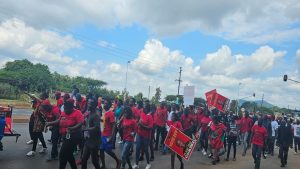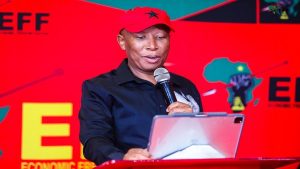Economic Freedom Fighters (EFF) leader Julius Malema says they are ready to work with like-minded political parties to change the Constitution and ensure the realisation of land expropriation without compensation.
Malema shared these sentiments while unpacking the EFF’s 2024 Election Manifesto on the SABC’s Morning Live.
He says politicians need to put their differences aside and look at what is good for poor South Africans.
He adds that the EFF will only listen to those who agree with their seven non-negotiable cardinal pillars.
“The PAC [Pan Africanist Congress of Azania] is there, and that which we are praying the PAC has been preaching since the time of Sobukwe. The ATM [African Transformation Movement] preaches the same gospel and many other formations that are there and are willing to say we need to put our differences aside and look at what is in the best interest of an African child; that’s the type of language we listen to.”
He also says, “MK Party [uMkhonto weSizwe Party] now also indicating that the expropriation of land without compensation is fundamental, and those are the kinds of language we listen to.”
EFF leader Julius Malema on land, the economy, opening Africa’s borders:
Malema has defended the feasibility of the party’s 2024 Election Manifesto promises, despite the existing fiscal challenges. Malema asserted that all their election commitments are practical and can be readily funded.
The EFF has pledged to double social grants, provide a R1000 stipend to unemployed matriculants, offer R3000 to first graduates, and R4000 for postgraduates.
According to Malema, the funding for these promises will be sourced through the nationalization of mines, banks, and other strategic sectors of the economy.
“Nationalization means there will be state-owned banks and state-owned mines. In Botswana, they are mining diamonds, and they are a 50 percent shareholder of that diamond. The little they get from De Beers, they are able to finance their students all over the world and they even give them a stipend,” says Malema.
“This stipend I am talking about is that we must give graduates a stipend in South Africa. In Botswana, they give students a stipend. Where does the money come from, diamonds? De Beers does that in Botswana, but just next door in South Africa, they refuse to do the same, and they want to create an impression no one will invest when the government is involved, but the government of Botswana is involved, and they have invested in Botswana.”
President @Julius_S_Malema listing possible parties the EFF is willing to work with. #MalemaOnMorningLive pic.twitter.com/dBtio73Zaz
— Sixolise Gcilishe (@SixoGcilishe) March 4, 2024
[IN PICTURES]: President @Julius_S_Malema in conversation with @SakinaKamwendo this morning, unpacking the EFF program of action for when we take over government come 2024 general elections. #MalemaOnMorningLive pic.twitter.com/nCguxIv5Jq
— Economic Freedom Fighters (@EFFSouthAfrica) March 4, 2024
President @Julius_S_Malema listing possible parties the EFF is willing to work with. #MalemaOnMorningLive pic.twitter.com/dBtio73Zaz
— Sixolise Gcilishe (@SixoGcilishe) March 4, 2024






